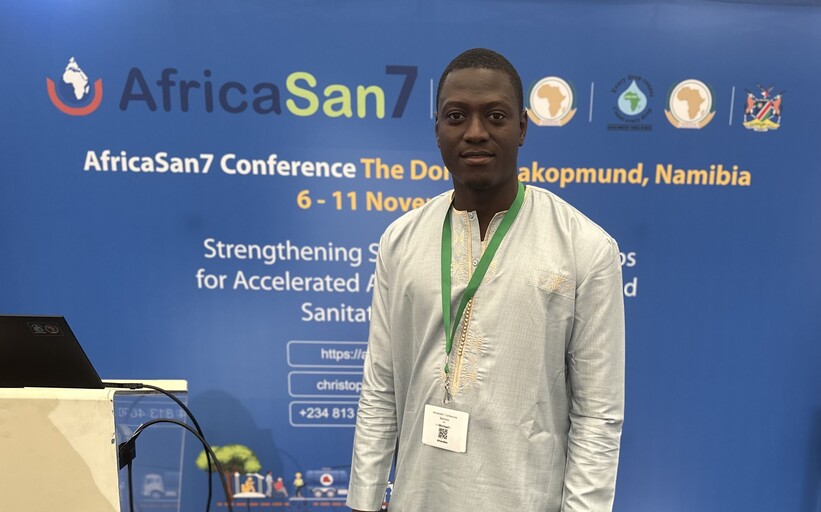
AfricaSan7 Conference, Swakopmund, 06 - 11 November 2023
Published on: 07/02/2024
“Systems and Partnerships for Safely Managed Sanitation and Hygiene”
As a first-time participant at the AfricaSan conference, I eagerly witnessed the dynamic proceedings of this regional event, which underscored the crucial emphasis on sanitation throughout the African continent. In this article, I share my reflections on the conference, highlighting the notable occurrences, contributions from IRC and One For All , and key takeaways that emerged from this impactful gathering.
Held from 6th-11th November 2023 under the specific objective of “Revitalizing the Pursuit of the Ngor Declaration Targets on Sanitation and hygiene”, AfricaSan 7 explored the current sanitation trends including the role of partnership and political leadership in advancing sanitation service delivery, sanitation systems, sanitation financing and market-based sanitation. The conference brought together over 400 participants from more than 20 countries and represented the diversity seen across the region. The event concluded with a regional declaration the Swakopmund declaration supposed to strengthen the implementation of the Ngor commitment and close the current gap in achieving the sanitation and hygiene focus of Sustainable Development Goal (SDG) 6 in Africa.
The “One for All” (OFA) global alliance, led by IRC, Water For People (WFP) and Water for Good to develop lasting climate-resilient water and sanitation systems, actively participated in the event including content contributions through formal sessions, side sessions and side meetings with key national and regional actors. This engagement in AfricaSan 7 was a strategic part of the OFA Africa Regional influencing agenda.
IRC Africa regional programme participation
Held the Sunday before the conference, Advocating for Safely Managed Sanitation and Sanitation Finance, an advocacy workshop, was designed to share experiences of advocacy for safely managed sanitation and to build capacity for alternative approaches to policy and budget advocacy for sanitation. The participants included UNICEF staff, government officials and NGO representatives from 18 countries.
Systems Strengthening for Safely Managed Sanitation breakfast held during the conference, reflected on learning points from AfricaSan 7, shared experiences of systems strengthening for sanitation, explored the UNICEF Safely Managed Sanitation Game Plan to Reach Safely Managed Sanitation and encouraged country representatives to identify 2-3 key take-home actions related to strengthening systems. It was clear during the breakfast that government and UNICEF delegations recognised the importance of a shift towards safely managed sanitation. Out of the 18 countries represented at the breakfast, 13 made concrete commitments to move towards safely managed sanitation.
Documentation activity
In addition to contributions to sessions and side events, IRC felt it was important to use the opportunity to get a baseline of current activities focusing on the transition from open defecation to safely managed sanitation.
Sixteen interviews were organised, targeting UNICEF country sanitation staff and government delegates from WCARO and ESARO countries present at the conference to understand their current context and activities and reflect on getting safely managed sanitation higher on ther agenda in their respective countries.
Ethiopia
The IRC Ethiopia team organized two sessions under the USAID Transform WASH project. The first Market-based sanitation and inclusion: experiences of USAID Transform WASH in Ethiopia shared progress in reaching universal coverage including successes and limitations during the development of the sanitation financing strategy, national sanitation subsidy protocol and subsidy pilot study. A panel discussion elaborated on how market-based approaches can be designed to also reach the most vulnerable populations. The second session Practical Application of Market-Based Solutions for Improved Sanitation: Lessons from USAID Transform WASH was an interactive session on the implementation of the strategy presented in the first session.
Malawi
Water For People colleagues led two sessions: Sanitation financing for increased access to improved household sanitation: A case of Blantyre City sharing the experience of Malawi and Leveraging sanitation investment to meet the SDG targets by 2030 in Africa: Example from Tanzania, Uganda, and Malawi. Participants in the session analysed, reflected, and explored more sanitation and hygiene financial solutions to attain SDG 6 targets by 2030.
These sessions were a perfect example of collaborative work between IRC, WFP and government officials where the Ministry of Health from Tanzania presented 'the road towards universal access to basic WASH services in rural Tanzania'; WFP Malawi presented the sanitation revolving fund to increase Sanitation and Hygiene Financing and IRC Uganda presented their experience supporting Kabarole District leadership towards delivery of WASH services for all by 2030.
Uganda
WFP organised a session on how to maximise existing market potential and create an enabling environment for faecal sludge management (FSM) in African Cities. The team shared investment cases on catalysing the sanitation economy and menstrual hygiene management in Uganda, the case of Blantyre city on public-private partnerships for sustainable FSM services, the experience of Kampala City with City-Wide Inclusive Sanitation programming and the experiences from Kigali City with private sector participation in faecal sludge management.
The AfricaSan 7 Conference provided crucial insights into the challenges and opportunities within the water, sanitation, and hygiene (WASH) sector. Here are the key takeaways:
In summary, the AfricaSan 7 Conference marked a significant milestone in addressing sanitation challenges across Africa. With a focus on revitalizing the pursuit of Ngor Declaration Targets, the event emphasised the crucial role of partnerships and political leadership. Key takeaways include the need for increased capacity building, cross-country knowledge sharing, and a shift in the discourse on financing—from funding insufficiency to enhancing sector creditworthiness.
The Swakopmund Declaration highlights the shared commitment to advancing sanitation and hygiene goals in line with SDG 6. Strengthened partnerships with organisations like AfWASA and AMCOW, alongside continued support from UNICEF, underscore a collective determination to drive positive change. As stakeholders harness the conference's momentum, there's a clear pathway to transformative impact, contributing to a healthier, more sustainable future for Africa. On to AfricaSan 8 in 2025 in Ghana.AfricaSan 7: key takeaways from a first-time participant
At IRC we have strong opinions and we value honest and frank discussion, so you won't be surprised to hear that not all the opinions on this site represent our official policy.